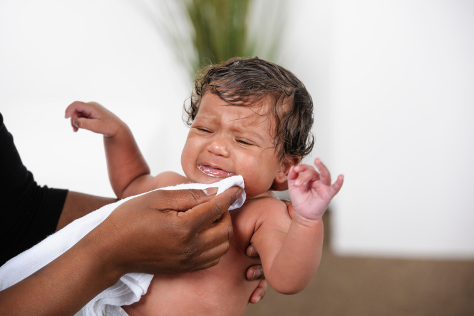What is a gastroenteritis?
Gastroenteritis is an infection of the stomach and bowel. It's not uncommon in babies, especially bottle fed infants, because warm milk is an ideal breeding ground for bacteria that can cause illness.
In children, the commonest cause of gastroenteritis is the rotavirus. It's very contagious, and bacteria can be transferred through poor hygiene when going to the loo. It can easily be passed around groups of young children, either through breathing in tiny particles of faeces carried In the air, or by mouth through contact with these particles on hard surfaces.

Infection is more likely in winter and spring and it's thought that all children will have had at least one case of rotavirus infection by the age of five years. Immunity to the virus builds with each infection, which is why rotavirus is almost exclusively a childhood illness.Gastroenteritis in adults is caused either by the norovirus or by a number of different bacteria. When it's a bacterial infection, it's usually as a result of food poisoning.
If you have gastroenteritis in pregnancy, consult your GP, who may want a stool or blood sample. Some of the different bacteria that can cause gastroenteritis could potentially cause problems for an unborn baby. Try not to worry, though: most cases only need treating with rehydration, and your baby may be monitored to check all is well.
What are the symptoms of Gastroenteritis?
Symptoms include repeated bouts of diarrhoea (more than three in 24 hours) and/or vomiting. Other signs include a high temperature (38-39°C) and stomach cramps.
What are the treatments and remedies of Gastroenteritis?
No treatment is required for gastroenteritis in most cases, and usually the illness will have passed within a week. Because it's so contagious, however, the patient should avoid contact with other people for 48 hours.
It's very important that anyone with the illness drinks plenty of fluids to avoid dehydration which is a particular risk for babies and under-twos.. In young children offer frequent breastfeeds or, if you are formula feeding, extra drinks of cooled boiled water. Usually the illness will have passed within a week.
If you think your baby (who is not being breastfed) or your child might be dehydrated, contact your GP, who may suggest rehydration powders. You mix these with water to make a drink that replaces important minerals and salts. In rare cases, a spell in hospital is needed for rehydration.In fully breastfed babies, usually extra feeds of breast milk are all that is required. If your child cannot keep liquids down for more than a day, see urgent medical treatment.
This guide
The information in this Bounty A-Z of Family Health is not a substitute for an examination, diagnosis or treatment by a doctor, midwife, health visitor or any other qualified health professional. If in doubt, always speak to a doctor.
Bounty will not be held responsible or liable for any injury, loss, damage, or illness, however this occurs or appears, after using the information given on this website and in particular the A-Z of Family Health.
Further help
For health advice and information 24 hours a day, 365 days a year, the NHS offers call and web services. You can also visit NHS websites for services, health information and health news at nhs.uk
- England – call 111 from any landline or mobile phone free of charge, or visit nhs.uk
- Scotland – call 111 from any landline or mobile phone free of charge, or visit nhs24.com
- Wales – call 0845 4647 , or visit nhsdirect.wales.nhs.uk
- Northern Ireland – visit hscni.net